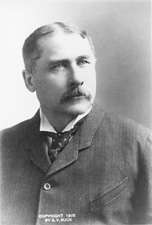Charles Henry Dietrich
| Charles Henry Dietrich | |
|---|---|
 | |
| United States Senator from Nebraska | |
|
In office May 1, 1901 – March 4, 1905 | |
| Preceded by | William V. Allen |
| Succeeded by | Elmer Burkett |
| 11th Governor of Nebraska | |
|
In office January 3, 1901 – May 1, 1901 | |
| Lieutenant | Ezra P. Savage |
| Preceded by | William A. Poynter |
| Succeeded by | Ezra P. Savage |
| Personal details | |
| Born |
November 26, 1853 Aurora, Illinois |
| Died |
April 10, 1924 (aged 70) Hastings, Nebraska |
| Nationality | American |
| Political party | Republican |
Charles Henry Dietrich (November 26, 1853 – April 10, 1924) was the 11th Governor of Nebraska.
He was born in Aurora, Illinois, and was of German ancestry.[1] His education was attained in the public schools of his native state and he quit at the age of twelve.[2]
Dietrich was married twice. His first wife, Elizabeth Slaker, died in 1887. After Elizabeth's death, he married Margretta Stewart Shaw in 1909.
Career
Dietrich was employed as a clerk in a hardware store in St. Joseph, Missouri. He moved to Chicago, Illinois and engaged in the hardware business. He moved to Deadwood, Dakota Territory (now South Dakota), in 1875 and engaged in mercantile pursuits, delivering goods on pack animals through the Black Hills. He then located and owned the 'Aurora' mine.
Dietrich settled in Hastings, Nebraska, in 1878 and engaged in mercantile pursuits and in banking. Dietrich founded the German National Bank at Hastings and served as the president of the bank from 1887 to 1905.[3] He became the president of the Hastings Board of Trade.[4]
Elected in 1900, Dietrich served as Governor of Nebraska from January 3, 1901 to May 1, 1901, when he resigned his governorship to fill a vacancy in the US Senate caused by the death of Monroe L. Hayward.[5]
Bribery charge
Before he took office Dietrich was charged with bribery for accepting money to appoint Jacob Fisher to be a US Postmaster. He was charged with conspiracy to receive a bribe, accepting a bribe and profiting by the leaning of a building to the government. Before the trial began, the judge held that Dietrich could not be prosecuted because the alleged bribery occurred after he was elected, but before Dietrich was sworn in as a US Senator. All the charges were then dropped.(1901) [6][7][8]
His tenure in the Senate lasted from May 1, 1901, to March 4, 1905, and he served as a pro-imperialist on the Lodge Committee investigating war crimes during the Philippine-American War. He did not run for reelection in 1904.
Death
Dietrich retired in 1905 and died in Hastings, Nebraska.
References
- ↑ "German ancestry Politicians in Nebraska". The Political Graveyard. Retrieved August 10, 2013.
- ↑ Charles Henry Dietrich. The Encyclopedia of Nebraska. Retrieved September 17, 2012.
- ↑ "Charles Henry Dietrich". National Governors Association. Retrieved September 18, 2012.
- ↑ Gov. Charles Dietrich papers at the Nebraska State Historical Society. Retrieved on July 9, 2009.
- ↑ Charles Henry Dietrick. The Encyclopedia of Nebraska. Retrieved September 18, 2012.
- ↑ https://cdnc.ucr.edu | Senator Detrich's Trial Comes to Sudden Ending, San Francisco Call, Volume 95, Number 40, 9 January 1904
- ↑ http://archives.chicagotribune.com Dietrich Wins in First Fight, The Chicago Daily Tribune: Tuesday, January 5, 1904, page 14,
- ↑
External links
| Wikimedia Commons has media related to Charles Henry Dietrich. |
- United States Congress. "Charles Henry Dietrich (id: D000341)". Biographical Directory of the United States Congress.
- Charles Henry Dietrich at Find a Grave
- National Governors Association
| Political offices | ||
|---|---|---|
| Preceded by William A. Poynter |
Governor of Nebraska January 1901 – May 1901 |
Succeeded by Ezra P. Savage |
| U.S. Senate | ||
| Preceded by William V. Allen |
U.S. Senator (Class 1) from Nebraska 1901–1905 Served alongside: Joseph H. Millard |
Succeeded by Elmer J. Burkett |

